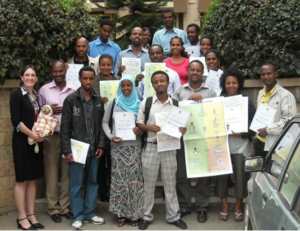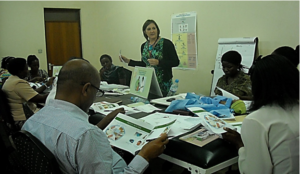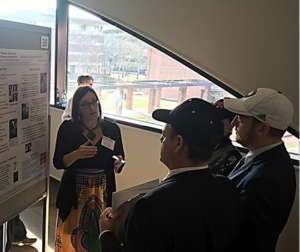This month, the American Academy of Pediatrics (AAP) is celebrating the ten year anniversary of a global initiative, Helping Babies Breathe. Sherri Bucher, PhD, an associate research professor of pediatrics at IU School of Medicine, is an international mentor for the initiative’s parent program, Helping Babies Survive, as well as the country mentor for Kenya. The Helping Babies Breathe initiative teaches healthcare workers the initial steps of resuscitation to save babies who struggle to breathe at birth. Since the initiative was launched, more than 850,000 health workers have been trained with these lifesaving skills in more than 150 countries.
Bucher has led the efforts to design, develop, evaluate, and implement life-saving newborn care programs throughout the East Africa region. As a member of the IU School of Medicine faculty for the past 15 years, Bucher says these kinds of global efforts require cooperative collaboration and relationship-building with various partners. As a mother and scientist, she says the experiences she has seen are very powerful and can cause change on a community level.
“When a mother and father see their baby be delivered and the baby looks lifeless, and then they see the nurse, very skillfully and calmly dry the baby, wrap the baby, rub the baby’s back and give the baby a couple breaths with a bag-and-mask device, and the baby suddenly cries, it completely increases their confidence in the health system overall,” said Bucher. “And it can cause a behavioral change. From then on, they trust the advice of their health care providers. They trust their nurses. When those people tell them to bring the baby back for vaccinations or a checkup, or to wash their hands when they’re going to hold their baby, they are much more willing to follow that advice.”
- Sherri Bucher, PhD, was invited by the Federal Ministry of Health to assist in a national scale-up and roll-out of Helping Babies Breathe in Mekele, Ethiopia in 2010
- Sherri Bucher, PhD, facilitates an Essential Care for Small Babies Master Trainer course for East African health care providers at Makerere University in Kampala, Uganda in 2014
- Sherri Bucher, PhD, presents preliminary results from the NeoWarm Indiana CTSI/IU Center for Global Health Pilot Grant to Indiana CTSI Navigators at the Indiana CTSI Annual Meeting in 2017
Before the COVID-19 pandemic started, Bucher would usually spend up to a quarter of the year in Kenya, visiting facilities and working with the study teams. She hasn’t been able to do that lately, but still keeps in touch with the Africa-based study teams on a daily basis through email or the messaging platform, WhatsApp. Bucher says COVID-19 has made a major impact on their efforts.
“That’s one of the things we’re really worried about,” said Bucher. “We have made so much progress over the past 20-25 years in terms of reducing newborn and maternal mortality. The way we’ve done that is by working collectively across a continuum of healthcare. If there’s a lockdown because of COVID-19, pregnant moms can’t get in for their prenatal visits. It’s very worrisome if they’re not able to get to a health facility to deliver or their baby appears to be sick after delivery and they can’t contact a trusted healthcare worker. We have the potential to lose all the gains we’ve made very rapidly.”
Despite those concerns, Bucher and her Helping Babies Breathe team have made ambitious goals for the future, including supporting the United Nation’s Sustainable Development Goal to reduce the global rate of newborn mortality to 12 deaths per 1,000 by 2030. According to the World Health Organization, the global rate of newborn mortality was 29 deaths per 1,000 in 2017.
Bucher and her colleagues will be building on the success of some of their other innovations, including the NeoWarm biomedical device which was supported by an Indiana Clinical and Translational Sciences Institute (CTSI)/IU Center for Global Health pilot grant (2016-2018), and was recently awarded a reciprocal innovation grant (2020 – 2022). NeoWarm is a wearable biomedical device for premature and low birthweight babies that includes a self-warming pouch and carrier, as well as a system to monitor vital signs and alert caregivers if the newborn’s body temperature fluctuates from a normal range.
Bucher was also recently the lead author, in a special supplement issue of Pediatrics, of a paper called “Digital Health Innovations, Tools, and Resources to Support Helping Babies Survive Programs.” Another mobile application she worked on, in conjunction with Saptarshi Purkayastha, PhD, from the IUPUI School of Informatics and Computing, received an award from the American Medical Informatics Association. At the AAP’s 2020 National Conference and Exhibition, Bucher’s abstract, “The Essential Care for Every Baby Digital Action Plan: Design and usability testing of a mobile phone-based newborn care decision support tool in Kenya,” was one of only four selected for oral presentation during a special session which celebrated the first decade of Helping Babies Breathe.
A poster related to a Helping Babies Breathe study that just wrapped up in Kenya and Nigeria was awarded the prize for best Global Health poster at the AAP National Conference and Exhibition 2020. Bucher was the senior author of the poster, “eHBB: A randomized controlled trial of virtual reality for newborn resuscitation refresher training of healthcare workers in Nigeria and Kenya.” The research for this study was done in conjunction with partners from the University of Washington, IUPUI, Lagos University, Moi University, and Oxford University, and funded by the Bill and Melinda Gates Foundation.
If students, fellows or other faculty members want to get involved in Bucher’s research, she encourages people to email her. Anyone who feels inclined to support her team’s efforts to reduce global maternal and newborn mortality can also participate in the “Buy one, gift one” program through Laerdal Global Health.



